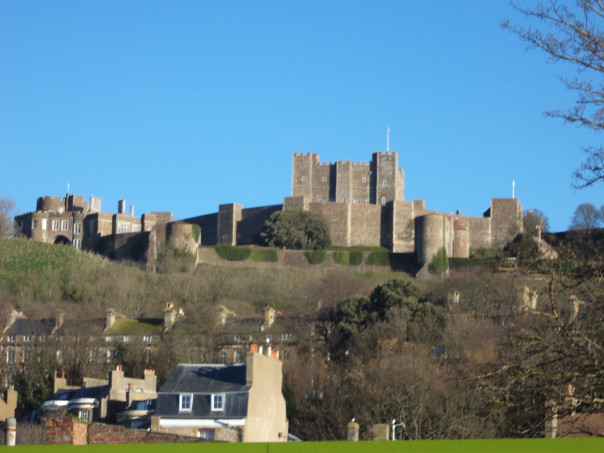Before I turn to the main event this week, the fortnightly meeting of the Kent History Postgraduates group and Dean’s presentation, I thought I would bring you up to date with the virtual ‘Tudors and Stuarts History Weekend’ that will take place on Saturday 27 and Sunday 28 March 2021, as well as Centre events before that.
We are planning our first venture into the world of virtual lectures for Wednesday 25 November when Dr Claire Bartram, the Centre’s new Co-Director will launch her edited collection on Kentish Book Culture. Among the contributors are several well-known Canterbury historians and librarians, including Dr David Shaw, and I know Claire is keen to involve at least some authors in the presentation. The intention is for Claire to explain how the book came into being, some of the ideas and personalities that influenced its final form, and just what is special about Kentish book culture during this crucial period that saw the growing role of printing, but still the important role of manuscript production and use. Then she will introduce some of her contributors, thereby further showcasing just how rich the culture of the written word was in civic, ecclesiastical, and household settings between 1400 and 1660.
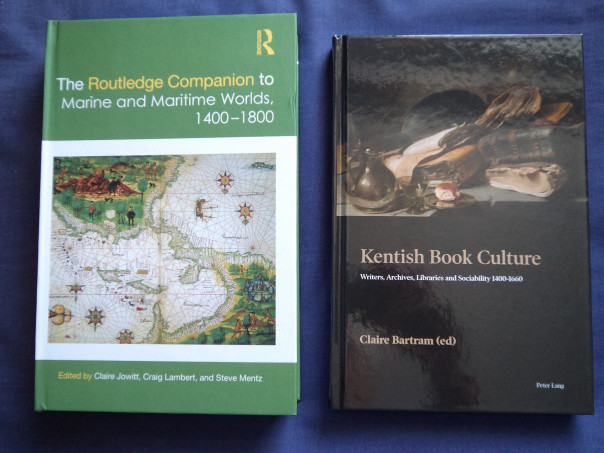
Moreover, we will take this opportunity to ‘present’ Ian Coulson Awards to Tracey Dessoy and Jane Richardson, two doctoral students, and possibly Victoria Steven, the new postgraduate who will be undertaking the MA research project on the St Alban’s House inventory. Normally, as regular readers of the blog will know, these Awards are given out by the Vice-Chancellor or the Faculty Dean at the Michael Nightingale Memorial Lecture, a joint initiative with the Agricultural Museum at Brook, but this year we had to cancel it. However, Professor Catherine Richardson will give the lecture next September, and we shall look forward to that because it will reflect her major AHRC-funded early modern household project, specifically the houses of the ‘middling sort’ in the 16th– and 17th-century countryside.
Please do put Claire’s book launch on Wednesday 25 November at 7pm in your diaries if this sounds interesting and I’m hoping to hand over details so that the booking for Teams can be set up by Arts & Culture for this free, but you-need-to-book event.
Keeping with the theme of free, but booking-required events, the annual Becket Lecture will be virtual this year to give far more people the chance to hear Professor Paul Bennett than would be possible in a socially-distance lecture theatre. I’m sure Paul is well known to many of you, and, as the recently retired Director of Canterbury Archaeological Trust and a Visiting Professor in the Centre, this seemed an ideal time for him to give us an assessment of his and the Trust’s findings on ‘Canterbury at the time of Thomas Becket’. This lecture will take place on Teams, and we are looking at Wednesday 16 December at 7pm. Again, as soon as I have the link for booking, I’ll let you know.
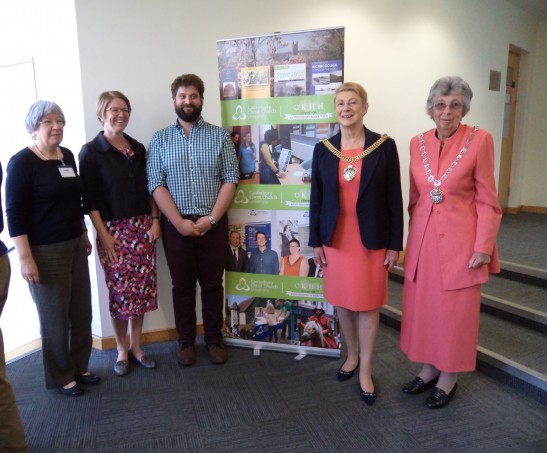
Moving into 2021 and moving up a gear, we will be holding a half-day online conference through Teams in conjunction with Canterbury Historical and Archaeological Society. Again free but requiring booking, and this conference will celebrate the Society’s centenary, albeit a year late! However, we will be keeping with the theme of years ending in ‘20’ because the four talks will focus on such years, although I have decided to be ‘greedy’ and have two years: 1320 and 1420, because they provide such a great contrast. The second speaker in the first session will be Dr Stuart Palmer, who many of you may remember from his lecture at the ‘Tudor and Stuart Canterbury’ conference that the Centre ran with the Kent History Federation in 2018. Stuart is now in Cambridge at Sidney Sussex College but the wonders of video conferencing mean that he can join us on the morning of Saturday 13 February to speak on Canterbury in 1520.
After a short break, the programme will recommence with Dr Lorraine Flisher’s lecture on Canterbury and 1620, another momentous year in the city’s history. Lorraine was one of the speakers at the ‘New Directions since Joan Thirsk’ conference in 2015, and more recently she contributed to Claire’s Kentish Book Culture and provided the ‘J’ and the ‘E’ for the tribute to Jackie Eales on her retirement in the Canterbury A to Z – available at the CCCU bookshop for £7.50, contributors £5. Now that the bookshop has reopened, you can visit but the online service remains available at https://bookshop.canterbury.ac.uk/ . If they don’t have the book you want, they are happy to order and the friendly service is brilliant.
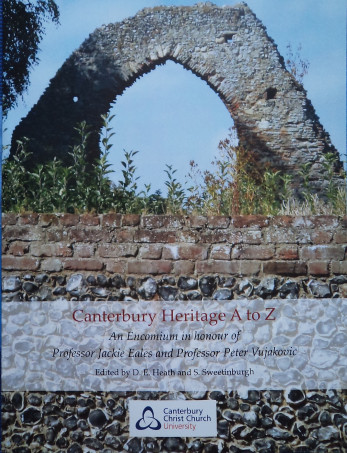
The final speaker will be Dr David Budgen, a lecturer in History and American Studies at Canterbury Christ Church University, whose doctoral thesis explored British children’s books and the First World War, which means his chosen ‘20’ is 1920. David was heavily involved in one of the early Centre workshops back in 2014 on Canterbury’s and Kent’s experiences in WWI. Moreover, he has regularly chaired sessions at the History Weekends, and it will be great to welcome him back to speak as a First World War specialist.
Hopefully our final virtual event before we can return to physical events in the early summer will be the ‘Tudors and Stuarts History Weekend’ in late March. I now have all of my speakers and the programme is coming together extremely well with experts due to lecture on fascinating subjects from what became turbulent relationships – Cardinal Wolsey and Henry VIII; and Elizabeth I and Mary Queen of Scots; to histories involving minorities – the Jews, and the black presence in Tudor England. Further details, I hope, shortly, I just have a few more details I need to sort out. As in previous years, the History Weekend will be used to raise funds for the Ian Coulson Award fund, which is helping a growing number of CCCU postgraduates researching Kent history and archaeology topics.
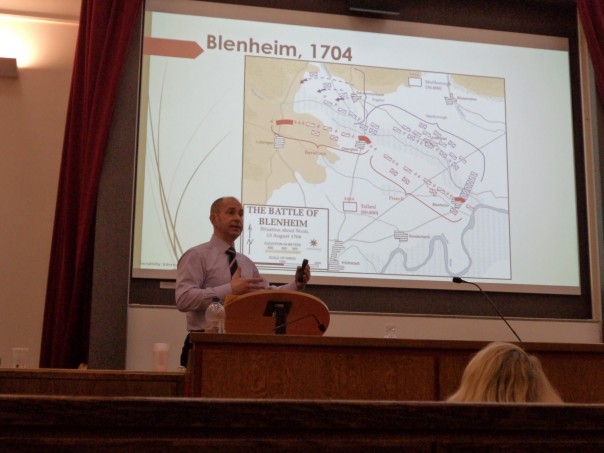
So now I want to turn to the Kent History Postgraduates and this time it was our second presentation since we started the new format. But first I just want to say Dean and Lily are due to give online presentations very shortly for Queen Mary’s and UEA respectively. To hear Lily’s ‘Barrows in late medieval imagination’ on 28 October at lunch time, please email: w.clayton@uea.ac.uk for the link, and for Dean’s ‘The archae system revisited’ on the same day but at 7.30pm, please go to https://www.qmul.ac.uk/sed/religionandliterature/news-events/seminar-religion-literature/ for instructions on how to join.
This week we heard from Dean, and in returning to think about events in Canterbury in 1264 Dean has been busy exploring chronicles. As he said this is a major shift from his perspective because his doctorate has largely focused on government records. However, the value of chronicles is growing on him and he has gained from reading Henry Bainton’s recent book, History and the Written Word: Documents, Literacy and Language in the Age of the Angevins. Consequently, he has been revisiting his earlier analysis of events from the sack of Worcester in February 1264 to the immediate aftermath of the battle of Evesham in August the following year as they affected various Jewish populations, including Worcester, Lincoln, London, and Canterbury. For the purposes of this presentation, Dean confined himself to Worcester and Canterbury, within the context of Kent more broadly, but he did mention that at Lincoln, the attackers were very specific in that their target was the book in the synagogue on which the Jews swore their oath as part of the process whereby their money-lending agreements were ratified.
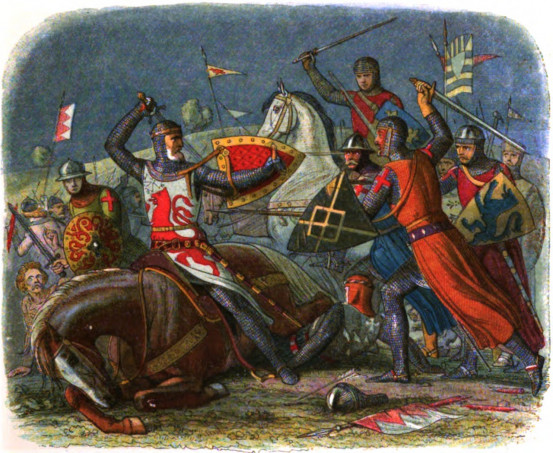
One of the issues Dean is keen to rectify in terms of accepted history is that the archae were kept in castles. Rather they were seemingly kept in the respective town, a factor that was obviously known by the Montfortian rebels who, as at Worcester entered the town through the old castle and then sacked the town, including the Jewry, except for the (later) cathedral, and captured the archa (chest). The value of these Jewish money lending records can be gauged because having taken the archa to Tutbury, it was recaptured by royalist forces under the Lord Edward and taken to Bristol, retaken again by Simon de Montfort’s forces and taken back to Tutbury.
So what of the Canterbury archa and its removal by the Montfortian forces to Dover? Working from the chronicles, and leaving aside the aborted march towards Northampton in early April 1264 and the subsequent sacking of the London Jewry, Dean has calculated that Simon junior’s forces then headed towards Rochester on 17 April, to be joined by those of Gilbert de Clare coming from Tonbridge. Their joint forces attacked Rochester, after which in the early part of the week beginning 21 April, Gilbert attacked Canterbury. His forces seemingly knew exactly which properties they wished to target, including the house of Simon Payable where the Canterbury archa was kept, which they carried off to the Montfortian stronghold at Dover Castle.
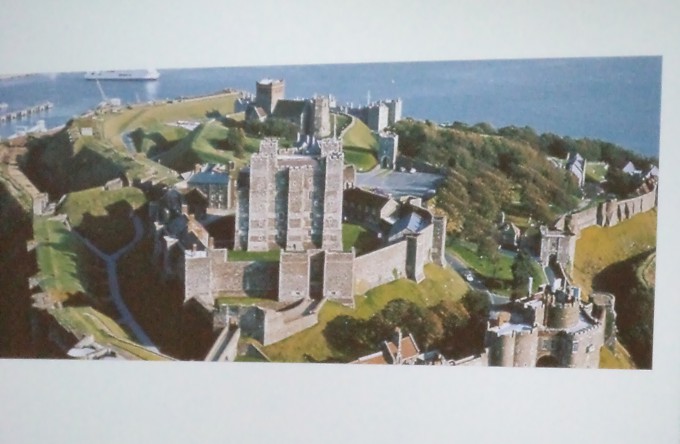
Interestingly, Dean does not see Simon de Montfort as showing a special hatred for the Jews, which is another feature of previous scholarship, albeit there were those among his allies who can be viewed as especially anti-Semitic. Among these is John de la Haye, deputy constable of Dover Castle, who seems to have been involved in all the attacks on the various Jewries. Even more telling, he was implicated in the attack on the Winchester Jews in 1265 even though two years earlier he had been named as their protector.
Dean’s presentation drew a number of questions afterwards, including Janet’s enquiry about the identities of those involved in the attack on Rochester and just how far down the social scale our knowledge reaches. A topic she is interested in because she is trying to assess how much contemporaries in north-west Kent would have known about the built environment away from their home communities.
We finished by having a quick round-up of what people had been doing recently, and, as an excellent piece of knowledge exchange, Janet mentioned that when she had taken a taxi recently, the driver had said that he had noticed her copy of Henry III through her window (it is a large tome!) and being interested in history but knowing little, he wanted to know how important Henry had been. As a consequence, Janet spent the whole journey providing a summary of Henry’s very long reign.
Thus, we had another very successful meeting and thanks again to Dean for his presentation and to everyone else for engaging with his topic. We wish both him and Lily every success in their talks next week.
 Centre for Kent History and Heritage
Centre for Kent History and Heritage Sheila Sweetinburgh
Sheila Sweetinburgh 1603
1603